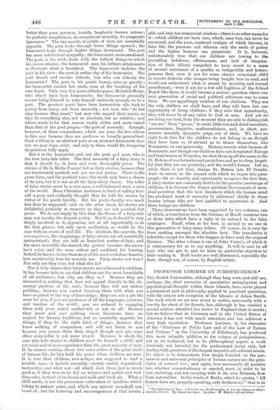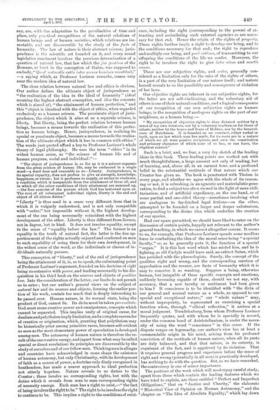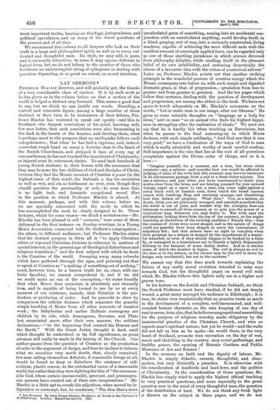PROFESSOR LORIMER ON JTTRISPRUDENCE.*
THE Scotch Universities, although they long were, and still are, perhaps, the chief nurseries of speculative metaphysical and psychological thought within these Islands, have never played a permanent part in philosophy applied to practical questions, with the almost sole exception of the labours of Adam Smith. The book which we are now about to notice, necessarily with a brevity far short of its deserts, has, although it has reached a second edition, attribted less notice in England than it merits ; but we believe that in Germany and in the United States of America it has met with much attention, and has achieved a, very high reputation. Professor Lorimer, in his character of the "Professor of Public Law and of the Law of Nature and Nations" in the University of Edinburgh, has produced this most valuable addition to the science of jurisprudence, not in its technical, but in its philosophical aspect, a work obviously not intended for the professional jurist only, but dealing with questions of the deepest import to all cultured minds. Its object is to demonstrate how deeply founded on the per- manent and universal principles of human nature-are the prin- ciples of natural law; and again, how necessarily all positive law, whether consuetudinary or enacted, must, in order to be just, enduring, and not carrying with it its own Nemesis, flow from natural law. In the words of Burke, which he quotes, "All human laws are, properly speaking, only declaratory," that is to
• The Institutes of Law : a Treatise on the Principles of Jurisprudence, as Deter- mined by Nature. By James Lorimer. London: W. Blackwood and Sons.
say, are, with due adaptation to the peculiarities of time and place, only practical recognitions of the natural relations of human beings and of human societie3, which relations are im- mutable, and are discoverable by the study of the facts of humanity. The law of nature is their abstract science; juris- prudence is the scientific art founded on it, and every sound legislative enactment involves the previous determination of a question of natural law, that law which the jag gentinm of the Romans, at least in the conception of Gains, was supposed to embody," Quod naturalis ratio inter ovine& horn lace constituit," —a saying which, as Professor Lorimer remarks, comes very near the modern idea of natural law.
The close relation between natural law and ethics is obvious. Our author defines the ultimate object of jurisprudence as "the realisation of the idea in the ideal of humanity" (ideal meaning the highest abstract conception, and idea the concrete which is aimed at), "the attainment of human perfection," and this "object is identical with the object of ethics, when regarded exclusively as a human science. The proximate object of juris- prudence, the object which it aims at as a separate science, is liberty. But liberty, being the perfect relation between human beings, becomes a means towards the realisation of this perfec- tion as human beings. Hence, jurisprudence, in realising its special or proximate object, becomes a means towards the realisa- tion of the ultimate object which it has in common with ethics." The words just quoted afford a key to Professor Lorimer's whole theory of legal philosophy. He uses the term " ethics " in its widest human sense, as "the science of human life and of human progress, social and individual :"—
" The object of jurisprudence is, so far as it is a science separate from the great science of human life, may be embraced in a single word—a word dear and venerable to us—Liberty. Jurisprudence, in its special capacity, does not profess to give us strength, knowledge, happiness, or virtue; but it professes to supply, or rather to vindicate, a condition which is inseparable from the attainment of them all, and in which all the other conditions of their attainment are summed up, —the free exercise of the powers which God has bestowed upon us. The root of all subsequent individual rights, liberty is the end and object of all citizen duties."
"Liberty" is thus used in a sense very different from that in which it is vulgarly understood, and is not only compatible with "order," but impossible without it, the highest develop- ment of the one being necessarily coincident with the highest development of the other. Liberty is thus different from licence, not in degree, but in kind. It does not involve equality, except in the sense of "equality before the law." The former is an equality in the truth of natural fact, the latter is the due ap- portionment of the rights actually enjoyed and conferred on men to such capability of using them for their own development, in the widest sense of the word, as the individuals or classes of in- dividuals naturally possess.
This conception of "liberty," and of the end of jurisprudence being the attainment of it, is, so to speak, the culminating point of Professor Lorimer's argument, founded on his doctrine of right being co-extensive with power, and leading necessarily to his dis- quisition in his third book on the sources and objects of positive law. Into the consideration of the latter, our limits do not permit us to enter ; but our author's general views on the subject of natural law and its sources and objects, forming the earlier por- tion of his work, contain too much that is deeply interesting to be passed over. Human nature, in its normal state, being the product of God, cannot lie. Its dicta must be taken pro vent ate. God must mean creative power and omnipotence, concepts which cannot be separated. This implies unity of original cause, for dualism and polytheism imply limitation, and a complete surrender of creation or origination, which, granting that polytheism may be historically prior among primitive races, becomes self-evident as soon as the most elementary power of speculation is developed among men. The autonomy of human nature is therefore the re- sult of the one creative energy, and (apart from what may be called special or direct revelation) its principles are discoverable by the study of ourselves and of our fellow-men. Thinking men in all ages and countries have acknowledged in some shape the existence of human autonomy, but only Christianity, with its development of faith as a source of power, a doctrine only dimly recognised in heathendom, has made a nearer approach to ideal perfection not utterly hopeless. Nature reveals to us duties to the Creator ; these involve no corresponding rights, but with the
duties which it reveals from man to man corresponding rights of necessity emerge. Each man has a right to exist,—" the fact of being involves the right to be." The right to be involves the right to continue to be. This implies a right to the conditions of exist-
ence, including the right (corresponding to the power) of at- tracting and assimilating such external agencies as are neces- sary for that end. Hence the origin of the rights of property.
These rights further imply a right to develop our being, and to the conditions necessary for that end ; the right to reproduce and multiply our being, and part ratione, of transmitting to our offspring the conditions of the life we confer. Moreover, the right to be involves the right to give inter vices and mortis causa.
These are our subjective rights, and order, generally con- sidered as a limitation only for the sake of the rights of others, is a part of the very limitation of our nature itself; and nature herself reveals to us the possibility and consequence of violation of her laws.
Our objective rights are inherent in our subjective rights, for the latter are not self-vindicating, and the voluntary aid of others is one of their natural conditions, and a logical consequence of our recognition of our own subjective rights as human beings, is the recognition of analogous rights on the part of our neighbour, as a human being :—
" My recognition of objective rights is thus dictated neither by a sense of my own interests, nor by a voluntary tenderness for those of others, neither by the hopes and fears of Hobbes, nor by the benevol- ence of Hutcheson. It is founded on no contract, either verbal or tacit, upon no law which man has made, for its roots are in a nature of which we all were passive recipients, and over (ho constitution and primary character of which none of us has, or can have, the slightest control."
Such is a brief, and, we fear, a very dry sketch of the leading ideas in this book. These leading points are worked out with much thoughtfulness, a large amount not only of reading, but of learning, and, above all, in an earnest tone, and a profound belief in the substantial rectitude of that nature which our
Creator has given us. The book is penetrated with Theism in every page, and whether we agree with the whole of its reason- ing or not, it is refreshing, in an agnostic and materialistic gene- ration, to find a subject too often viewed in the light of mere utili- tarianism, and of artificial expediency, on the one hand, or of some partial and one-sided theory—sometimes involving what are analogous to far-fetched legal fictions—on the other, attempted to be founded on a larger and deeper substratum, corresponding to the divine idea which underlies the creation of our species.
Had our space permitted, we should have liked to enter on the
discussion of certain points, happily not relevant to the author's general teaching, in which we cannot altogether concur. It seems to us, for example, that Professor Lorimer spends some needless force in combatting the idea of the moral sense being" a special
faculty," or, as he generally puts it, the function of a special "organ." It is this last word which has misled him, and he is fighting, as old Carlyle would have said, an extinct Satan, which has perished with the phrenologists. Surely, the concept of the qualities right and wrong, and the corresponding emotion of approbation and the reverse, are facts of humanity which it is easy to conceive it as wanting. Suppose a being, otherwise human, but incapable of these specific concepts and emotions, suddenly becoming capable of them, should we not say, with accuracy, that a new faculty or sentiment had been given to him ? If conscience is to be identified with "the dicta of our general and normal nature as a whole, as opposed to our special and exceptional nature," our "whole nature" may, without impropriety, be represented as exercising a special function when, through "ethical reflection," it arrives at a moral judgment. Treudelenberg, from whom Professor Lorimer frequently quotes, and with whom he is specially in accord, under the common bond of Aristotelianism, is under the neces- sity of using the word " conscience " in this sense. If the dispute verges on logomachy, our author's view has at least a commendable origin in his mind, arising from his profound conviction of the rectitude of human nature, when all its parts are duly balanced, and that that nature, in its entirety, is cognisant of the fact, and is aggrieved by its violation. That it requires general progress and experience before the sense of right and wrong (potentially in all men) is practically developed, has nothing to do with the question. But, as we have remarked, the controversy is one of minor importance. The portions of the work which will most repay careful study, apart from those which contain the leading features which we have tried to explain, are those entitled "Perfect and Imperfect Obligations," that on "Justice and Charity," the elaborate "Historical View of Opinion on Human Autonomy," and the chapter on "The Idea of Absolute Equality," which lay down most important truths, bearing on theology, jurisprudence, and political speculation, and on many of the vexed questions of the present and of all time.
We recommend this volume to all lawyers who look on their craft in a large and philosophical spirit, as well as to every cul- tivated and thoughtful man. Its style, we may add, is pure, and is eminently attractive ; to some it may appear deficient in logical form, but we do not belong to the number of those who desiderate an uninterrupted string of syllogisms in dealing with questions depending, to so great an extent, on moral intuition.
















































 Previous page
Previous page